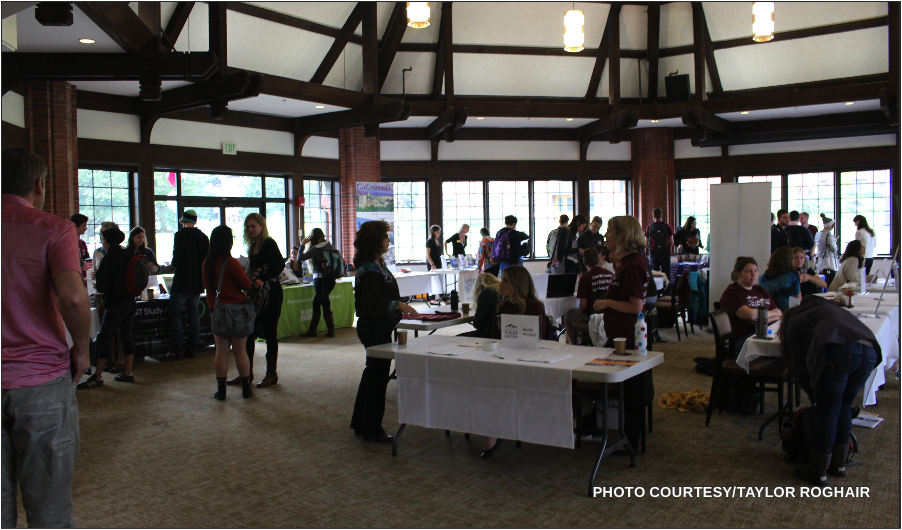For some students, college is as far from home as they have ever been, and sometimes it is as far as they want to go. Others, however, make the choice to study abroad. During the 2008-09 academic year approximately 260,300 American students spent time studying abroad. Around 47 percent of them were in Europe, according to the Institute of International Education. According to the Puget Sound website, in the spring of 2011, 135 Puget Sound students studied abroad in 31 different countries.
Georgia Cohen, a Theatre Arts major at Puget Sound who spent fall of 2010 in Dublin, Ireland, described her experience as nothing short of “incredible.” While abroad, Cohen was enrolled at the Gaiety School of Acting, where she spent eight to ten hours in classes each day studying alongside Irish students.
“My favorite thing was getting so immersed in the culture. Since I was with Irish students everyday…I really felt like I got to know them and they gave me and all the Americans a really authentic Irish experience. I honestly feel like Dublin is a second home now,” Cohen said.
Alongside other American students, she was also able to volunteer at the Dublin Fringe Theatre Festival.
Similarly, Teddi Hamel participated in a program involving both classroom learning and field experience. For Hamel, who spent fall of 2010 in India, the experience was unique.
“The world literally became our classroom,” she said. “It was some of the most engaging learning I’ve ever done—beyond academics, to another level of human experience.”
In her program with SIT, Hamel spent two months studying in Delhi, followed by four weeks in southern India doing independent research.
According to Hamel, the idea of her research was “to find a correlation between Hindu text and actual social understanding of the natural world in a real-life setting.”
For many students, the social and cultural experience can be just as important as the academic experience during time abroad.
Cohen, who shared an apartment with three other girls, believes that “living independently meant that we were able to live like Irish citizens and really develop a connection to the country and our neighborhood.”
Hamel, on the other hand, expressed the witnessing of noticeable cultural differences as a very valuable part of the experience: “Seeing this dichotomy of familiar and comfortable alongside the absolutely unfamiliar and challenging—it helped me develop as a person and helped me come to have a more inclusive, expanded perspective,” she said.
The Director of International Programs at Puget Sound, Roy Robinson, also cites personal growth as one major advantage of participation in study abroad.
“You open your mind a little and see, ‘Wow. There’s a much bigger world than what we surround ourselves with right here,’” Robinson said.
Furthermore, many students experience a kind of self-discovery while abroad.
“We see students come back, and maybe something on that program caught their eye and they want to study that more in depth here, or they want to pursue something related to that, or it might have even been that they had an interaction with a group there and they want to try to get involved with a community like that back here,” one student said.
Although one traditional purpose of study abroad is the development of foreign language skills, Robinson believes it can be just as beneficial to pursue other academic interests as well.
“Language is kind of an obvious one, and it’s a strong one, but if you’re a biology major, you can go see how someone is doing something differently there…or study some marine biology that you wouldn’t be able to here,” Robinson said.
However, for students going abroad to improve their language skills, Robinson recommends staying with a host family.
“Living with a host family versus in an apartment, surrounding yourself and immersing yourself in that culture, is going to help you find out more about that place and make stronger connections,” Robinson said.
This was very true for Mike Knape, an International Political Economy major and Spanish minor who lived with a host family in Santiago, Chile during fall of 2010.
For Knape, the best part of the experience was “traveling and living in a very different culture from my own, and being so detached from U.S. culture.”
Though Robinson finds that most, if not all, students find the experience of studying abroad to be a positive one, there are struggles that students face.
“I think there are ups and downs while you’re on the program; I don’t think it’s a honeymoon the whole time you’re there…but as for the overall experience I don’t find many students coming back saying it was a negative,” Robinson said.
Fear of missing experiences on campus while abroad can also be a deterrent for students.
“I don’t think you’re missing out,” said Robinson. “I think you’re adding to whatever your interests are while you’re there.”
Homesickness was a problem that both Cohen and Hamel dealt with, and one that Robinson considers fairly common. In order to cope with homesickness, Hamel suggests keeping a journal.
“It can be really hard to pinpoint why you are feeling something on a normal day at UPS, so imagine how hard it is to figure out your thoughts in a different country,” Hamel said. “Writing definitely kept me sane through the struggles, helped me solidify all my happy memories, and allows me to look back on any given day and replay it in my head.”
Despite any obstacles students must overcome, it is important to appreciate where you are.
“You have to take advantage of this experience, because it’s over so quickly,” Cohen said.
Similarly, Knape advises students going abroad to “get off of the beaten track and really challenge yourself. Stay away from other Americans and take time to travel when you can.”
In this day and age, the development of a world perspective and an understanding of other cultures is invaluable.
Cohen said, “Studying abroad is an incredible experience, and if you can make it work, I highly suggest going!”



